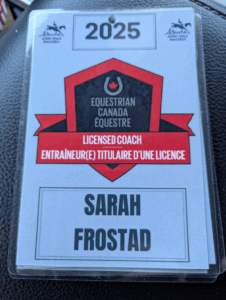 The AHTA has created Coach Identification lanyards for Eventing coaches in order to make it easier for competition officials to identify who is Licensed/Registered with EC for 2025 and who is allowed to be coaching in the warmup ring.
The AHTA has created Coach Identification lanyards for Eventing coaches in order to make it easier for competition officials to identify who is Licensed/Registered with EC for 2025 and who is allowed to be coaching in the warmup ring.
If the coaching certification needs to be renewed during the year, make sure you renew. This is not a free pass to be in the warmup ring. The coach still needs to be registered with the show office, on the rider entry form. Registered Coaches must pay the EC Fee of $50/competition. The Temporary Coach fee is $225/competition
There are “Temporary” coach ID lanyards that will be distributed at competitions for the coaches who are not EC Coach certified and are registered with the show office. This lanyard will be available at the show office and must be returned at the end of the competition.
For the EC Certified Coaches who are not listed on the Find A Coach list – we need to hear from you in order to get your identification made.
Email messages were sent out to all coaches listed on the EC Find A Coach list in order to get the ID Lanyard delivered. There are a number of coaches who have not responded to the email and the ID lanyard is being held by Kathleen Ziegler. Please email ahtahighperformance@gmail.com if you have any questions or want to make arrangements to receive your lanyard.
Volunteers
Job Descriptions
Our events could not run without the help of dozens of volunteers – there’s no better way to get really close to the action, and to learn more about our sport!
Can you help out? Our organizers would love to put you to work! And you’re usually well rewarded with great lunches and enormous thanks. Contact the event sites directly if you are interested in volunteering, their information is at https://albertahorsetrials.com/index.php/event-sites/
Our friends at the United States Eventing Association (USEA) have also put together some great resources for volunteers, check out the links below!
Volunteer Checklists
Volunteer Position Videos
Stadium timers need the following: stopwatches, clipboard/ paper/order of go/writing material, radio, seat/chair, waterproofing. They should be prepared to: get wet/hot/ bitten, attend very carefully, filter out extraneous stimuli, operate a stopwatch and radio, follow instructions, remain calm in moments of anxiety, be able to round up partial seconds to whole seconds, be able to turn minutes into seconds and seconds into minutes.
Jump judges need the following: a pack sack, writing equipment, waterproofing (for self and paper), seat/chair, radio, food/drink, papers and clipboard, a watch. They should be prepared to: get wet/ hot/bitten, walk, be lonely, act independently, make judgments, write or draw what took place when unsure of a decision, use radio, follow instructions, help rider (when asked, under certain conditions).
Check out some pictures of our great volunteers – Please offer to help, our events can’t run without you!
Cannot call API for app 405460652816219 on behalf of user 10166348472250258